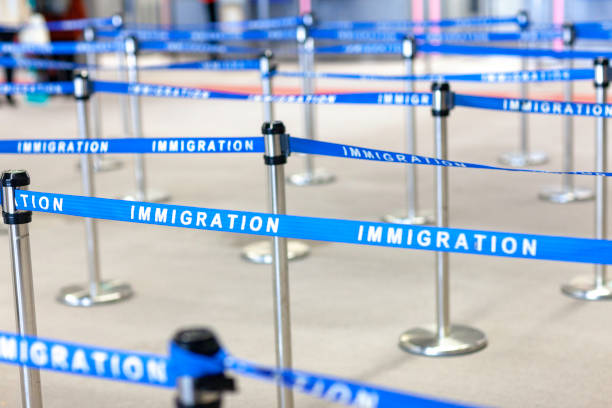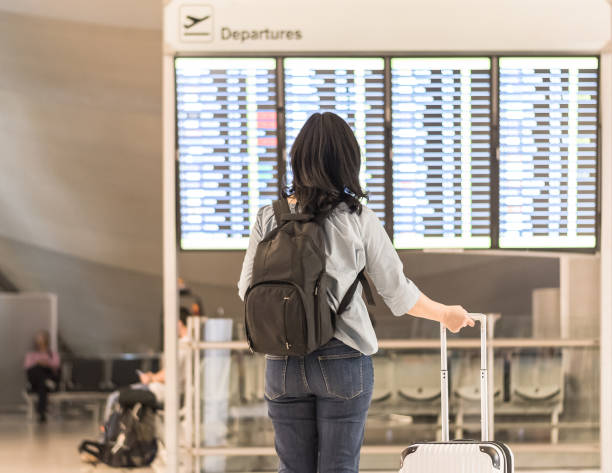Airport Immigration Questions | Flightlayaway
If
like most people, you have nothing to hide, getting through customs can feel
like a drawn-out process with an unnecessary barrage of questions.
However,
knowing what questions to expect and having useful information to hand in can
really speed up the process.
We’ve
put together some of the most common and unusual questions asked at airport
customs so that you’re fully prepared for your next international flight.
Most common questions
Often,
customs officers will ask a question and be more interested in the manner in
which you respond than the answer to the question itself. So, as long as you’re
being truthful, there’s really nothing to worry about!
Regardless
of your situation, it’s always best to answer questions with 100% honesty, even
if your situation is complicated. What you thought as a little white-lie,
helping to speed the process up can actually turn into more questioning and
hassle.
Where have you
flown from?
This
is a common question that’s asked to determine whether you’re flying from a
high-risk country, or, just out of interest.
You
should answer with the city and the country. For example, ‘I’ve flown from
Montevideo, Uruguay.”
Where are you
staying?
Customs
officers will want you to be specific on this, so make sure you know the
address of where you’re staying. You might also be asked to put this on your
immigration card.
If
you’re backpacking and haven’t decided where you’re staying yet, it’s worth
noting down a hostel or hotel that you’re intending to stay at and give the
address of that. If you’re staying on a cruise ship, put the name of the ship,
cruise company, and the port.
What’s the
purpose of your visit?
While
this can be answered with a simple ‘leisure’ or ‘business’, the more specific
you are, the less likely additional questions will be asked. For example, ‘I’m
traveling to explore the city’ or ‘I’m here for a business meeting on Tuesday’
is more likely to cover the details that they’re interested in.
How long will you
be staying here?
This
is one of the most common questions at airport customs. You don’t have to be
exact with the number of days — for example, an answer of ‘three weeks’ should
be okay. But if the length of your stay isn’t in compliance with visa rules and
the country’s immigration policies, you might be asked further questions.
What’s your
occupation?
This
might be used to give an indication of your income and to see if it fits with
your answer to the amount of money that you have (see later). But for the most
part, this is a prime example of when customs officers are more interested in
the manner in which you answer the question, rather than the answer itself.
They’re looking for quick and direct responses, without hesitation.
In
certain jobs, such as law enforcement, you might also be asked to provide proof
of your occupation in the form of identification or documentation.
Do you have
anything to declare?
Depending
on where you’re traveling to, there may be certain items that aren’t allowed in
the country or have to declare tax on.
It’s
imperative that you check the country’s rules for the items that you’re
importing, as bringing something illegal into the country or failing to declare
is against the law and you’ll most likely be fined.
When were you born?
This
is another example of a question that is asked to see how you respond. Any
hesitation will likely raise suspicion. And, of course, if you give a date that
doesn’t match your passport you’ll be questioned further.
Unusual questions
Even
if you feel ultra-prepared and think that you know any and every question that
gets thrown your way, you should still expect the unexpected. Occasionally, an
officer might ask you a question that will throw you off guard. Remember —
there isn’t a fixed list of questions that they ask. So, as long as it relates
to your travels, they can pretty much ask you anything that they like.
Regardless of how irrelevant or unusual it might seem.
Did you know the
x/y rule about our country?
Frequent
flyer and Director of Marketing for Speak, Edward Sturm told us that he was
asked this question a lot when travelling through Eastern Europe, where there
are specific rules for each country.
For
example, in Belarus, it’s mandatory to have health insurance that has a minimum
value of €5,000 EUR and covers the length of your stay. In this case, it’s an
essential rule that you’re hopefully already aware of, but you might also be
asked about a less obvious rule that exists. That’s why it’s worth brushing up
on the rules of the country beforehand. And, if you’re caught off guard, ask
the customs officer for more information and the steps that you need to take in
order to comply.
How much money do
you have?
You
might be asked this question in two different senses.
The
first is asking how much physical cash that you have on you. This is a fairly
common question, as each country has its own rules on the maximum amount of
cash that you can bring into the country before you have to declare it.
The
second way you might be asked is how much money you have in your bank account.
The reason a customs officer might ask this is that they want to know that
you’ll have enough money to fund your trip and to leave the country when you’re
supposed to. Customs officers can get pretty particular about this, travel blogger
told us that when in Ireland “I jokingly asked the customs official if he
wanted me to log into my bank account to show him how much money I had”. He
said “yes.“
Did you pack your
own bag?
99%
of the time you would have packed your own bag. So, if you have packed your own
bag, answer with a prompt ‘Yes. I packed my own bag’.
However,
there might be an occasion where someone has helped you pack your bag, or a
partner or family member might have packed it for you. What they are really
asking with this question is whether you know all of the contents inside your
bag, which is something you should definitely make sure of before flying.
The key to answering this question is to avoid being ambiguous. If you didn’t pack your bag, don’t answer with a simple ‘no’. This will lead to more questioning. Instead, answer “no, I didn’t pack the bag myself, my partner did. However, I’m aware of all of the contents inside the bag.’
Questions that passengers ask
It’s
not just the customs officers that ask the questions. Grant Patterson, who was
a customs officer at the Canada Border Services Agency shared with us some of
the most common questions that he was asked in his seventeen years at Vancouver
International Airport (YVR).
Hopefully,
by answering them here, we can save inquisitive travellers of the world a bit
of time when passing through customs.
What do you guys
look for?
Customs
officers are looking for anything that is prohibited by law to import or export.
The big concerns are drugs, illicit cash, weapons, child sexual abuse material
and any evidence of terrorist activity, as well as people who are trying to
enter the country under false pretences.
Why are you
asking me all these stupid questions?
Some
of the questions that are asked at customs may seem trivial and ‘stupid’, but
it's the sheer volume of those questions that is designed to catch out those
who are lying. The idea is that if a person is lying, they can only be coached
to lie to a certain extent and by continuing to ask questions, they’ll slip up
eventually.
Don’t you need
the warrant to search me?
In
most countries, the laws behind border searches are much less strict than
inside the country itself. This means that customs officers have the right to
search you without the need for a warrant. Strip-searches only require a
supervisor’s approval and only really invasive searches — such as internal body
searches — require a warrant or consent.
Aren’t you just
searching for me because I’m (insert group here)?
Grant
tells us that almost all referrals are based on what’s called a ‘multiplicity
of indicators’ articulable in court.
If
you do believe you’ve been singled out for harassment, it’s extremely important
to find out the complaint process and file an official complaint. Grant assures
us that these complaints won’t be ignored and are dealt with very seriously.
I thought weed
was legal here?
At the moment, it’s illegal to import marijuana for recreational use anywhere in the world, even if you’re flying between two destinations where it’s legal. For example, if you’re flying between two US states where marijuana is legal, the drug is still illegal by federal law, which makes it illegal to fly with. The same rules apply when flying with marijuana between the US and Canada.






Comments
Post a Comment